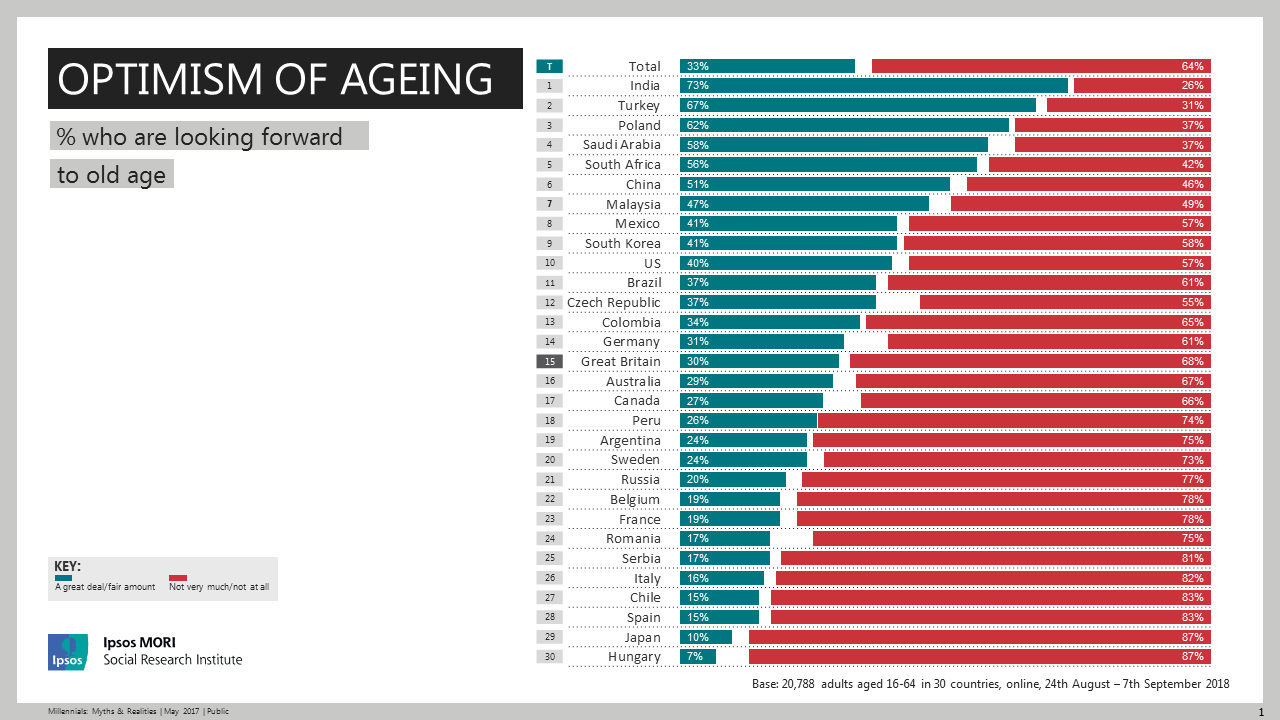Budapest, Hungary – The way we consider old age, and whether we look forward to it or painfully dread it, depends on a wide variety of factors, from health and financial matters to social and familial considerations. And a lot of those different factors in turn depend on the exact country you live in, as a new study highlighted.
According to an Ipsos poll, published earlier this month and conducted with adults aged 16-64 in 30 different countries, Hungary is the world’s most pessimistic country regarding old age: only 7% of Hungarians say they look forward to later life, an all-time low compared to other countries. Other nations that rank among the least optimistic about ageing are Japan (10% declare they look forward to it), Spain, Chile (both 15%), Italy (16%), Serbia, Romania (both 17%) as well as France and Belgium (both 19%).
At the other end of the scope, the most optimistic countries about the idea of getting old are India (73%), Turkey (67%) and Poland (62%). Other countries where a majority of the population looks forward to it are Saudi Arabia (58%), South Africa (56%) and China (51%).
With a score of 37%, the Czech Republic appears close to the world average of 33%, signalling that for a vast majority of us, old age is more commonly associated with the downsides than with its potential advantages.

While “the global opinion is that old age begins at 66”, variations in countries are also significant, Ipsos explains. And the words most regularly associated with old age, according to the survey, are “wise”, “frail”, “lonely” and “respected”.
“Our research shows that, globally, there is a great deal of negativity towards later life, with financial and health concerns prevalent”, writes senior client director at Ipsos Mari Harris.
And this seems to be particularly true of Hungary, and appears very alarming considering how fast the country’s population is ageing: Hungary’s population is expected to fall by 15% by 2050, according to the U.N., making it one of the most vulnerable European countries to demographic decline. And while the current government is notoriously opposed to seeing immigration as a solution to the problem, it’s betting everything on a strong family policy and unprecedented tax incentives to urge Hungarian families to have more children.
But as the Ipsos poll suggests, reversing the demographic trend may be one thing. Addressing the widespread pessimism and negativity associated with old age is another.

Pingback: Top 10 weirdest questions and search terms that brought you to Kafkadesk – Kafkadesk
Pingback: Top 10 weirdest questions asked online about Central Europe (Part 1) – Kafkadesk
Pingback: Central Europe’s population to decrease by over 30% by 2100 – Kafkadesk
Pingback: Top 10 weirdest questions asked online about Central Europe (Part 2) – Kafkadesk
Pingback: Hungary’s population sees sharpest decline in almost 150 years – Kafkadesk